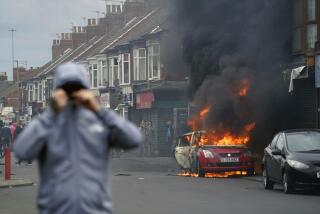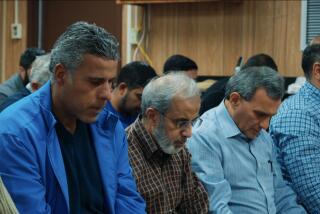Britain’s Muslim Outreach Hits a Rough Patch
- Share via
LONDON — In the war to win the hearts and minds of budding terrorists, Imtiaz Qadir is an unlikely casualty.
A British-born Muslim who runs a neighborhood gym, Qadir, 49, hoped to counter religious extremism among the young by starting a community organization. He signed a lease on a large meeting hall and formed a foundation. After deadly bombings on the London transit system in July 2005, he helped sponsor a Muslim forum and party that drew 500 young people and earned him national recognition.
But then, he said, everything went wrong.
Angry that he allowed music at the party, conservative Muslims tried to kick Qadir off the mosque governing board. Several regulars at his gym were arrested Aug. 10 for allegedly planning to blow up American-bound jetliners. And his government funding has dried up, leaving him no income to make the monthly rent on the hall.
“We have until [this] morning to come up with one month’s rent,” Qadir said last week. “If not, we’re out.”
Qadir’s plight is a cautionary tale about Britain’s effort to use community groups and social programs, not just Scotland Yard and handcuffs, to battle violent extremists.
Besides detective work, the British government has tried to root out the causes of terrorism among Islamic youths the bureaucratic way. It has generated studies and convened working groups that have consulted with 1,000 British Muslims.
The result is a plan that includes reviewing the nationwide school curriculum, holding community forums to prevent “Islamophobia” and launching “road shows” for Islamic scholars to lecture Muslim youths on the peaceful teachings of their faith.
“It’s political correctness gone mad,” said Anthony Glees, a professor at Brunel University in London and a widely regarded terrorism expert.
Yet little substantial work has been done, in large part because the government’s efforts have been overrun by events.
In 2004, the Home Office, which is responsible for domestic affairs, conducted a study that said anger about the wars in Iraq and Afghanistan was a significant cause of terrorist activity. Fifteen months later, suicide bombers killed 52 commuters and injured more than 700 in London in protest over what they called Western aggression against Islam.
Last month, officials responsible for “engaging” the Muslim community issued a progress report on their efforts to promote “good citizenship, social cohesion, religious tolerance and peaceful coexistence.” This month, police arrested 24 young Muslims for an alleged plot to blow up American-bound jetliners.
Yousef Khoei, a Muslim educator who has worked on the government’s community approach, acknowledged that the programs had yet to hit their stride. But he said they were necessary to cultivate moderate leaders from within an insular and chaotic religious community that he said had been hijacked by fiery imams.
“It took a good 30 years for the extreme organizations to get where they were,” said Khoei, one of the directors of a foundation that runs Muslim schools in Britain and North America. “It may take an equally long time to counter it.”
The government’s community-oriented effort also has sent conflicting signals to Britain’s 1.6 million Muslims.
Although government ministers have visited Islamic communities and one department has drafted a “script” to help public officials avoid using offensive terms, Muslims are fuming over government reports that use the phrase “Islamist terrorists.” They are especially angry about Prime Minister Tony Blair’s apparent reluctance to see the bombings as a political act and not a religious one.
“The government seeks greater integration to achieve a more cohesive society but seems equally determined to cause more alienation by loose and lurid language,” said a recent editorial in the Muslim News.
Some Muslims are used to intervention in their customs. A Forced Marriage Unit intervenes in behalf of women who face ostracism, kidnapping or violence if they refuse arranged nuptials, still common among some immigrants from the Indian subcontinent, many of whom are Muslim.
The government stepped up its activities after the July 2005 bombings by convening seven citizens groups and rushing out a report titled “Preventing Extremism Together.” It listed 64 recommendations, whose implementation is under the direction of a newly formed Department of Communities and Local Government.
Only a handful of the recommendations have been carried out. The department hired a “Muslim media specialist” to counteract anti-Muslim images in the tabloid press. An Islamic consultant is reviewing the national curriculum, and the government promises a Muslim student handbook by the next academic year.
The most significant change has been an independent citizens group that helps advise the government on which radical clerics to keep out of the country. The panel is scheduled to begin work on qualifications for the licensing of imams, and recently published a “good practice guide” for mosques, which serve as the nucleus of Muslim religious and community life.
“We have to have structures so we don’t allow extremist ideas” to be fostered, said Khoei, adding that a program for licensing imams should be in force by the end of the year.
Glees, the terrorism expert, called the government’s policy a mistake.
“What it has done is to imply that the Muslim community, or the community of Muslims, has some kind of special status in the U.K.,” he said. “They’ve never done this for blacks. They’ve never done this for Jews. They’ve never done this for anybody. The government is treating a section of the British people differently than others, and that’s precisely what needs to be avoided.”
Glees also questioned some of the Muslim leaders the government had deputized in its effort. He said one was involved in an educational institute supported by a Pakistani-based group that promoted the superiority of Islamic law. Another, he said, has “extreme views.”
Picking out extremists isn’t always easy, said Qadir, the gym owner and frustrated community organizer in Walthamstow, a blue-collar town east of London where several of the alleged airline plotters lived.
Qadir said he knew five of the suspects. Three were regulars at his gym, located on the second floor of a converted garment factory. He doesn’t think they are guilty.
“These young men I knew,” Qadir said. “Going by their character and the way they appeared, it is totally, totally the opposite of what they’re being portrayed as.”
Qadir said he was disappointed in what had come of his efforts to build bridges with at-risk youths in Walthamstow. He leased the hall underneath his gym for events, one of the first of which had to be called off when a fight broke out.
He scored what appeared to be a big success with a “Defending Da Hood” party and community forum that he and his mosque, the Waltham Forest Islamic Assn., cosponsored after last year’s transit bombings. About 500 young people showed up to talk to police and enjoy free food.
But when Qadir played a mix of Middle Eastern and pop music, the imam objected and walked out.
That led to infighting at the mosque. Qadir said he prevailed against an effort to throw him off the governing board, but opponents organized a boycott of his gym, where men and women worked out on separate days to respect Islamic law.
Since then, local government officials have eliminated his funding for youth activities because of budgetary reasons. And they asked him to cancel a recent booking for the meeting hall when police discovered that his customer was the extremist group Al Ghurabaa under another name. The group has since been banned.
Qadir said he was glad to comply, but that it didn’t bother him to rub shoulders with extremist groups.
“Keep your friends close but keep your enemies closer,” he said.
More to Read
Sign up for Essential California
The most important California stories and recommendations in your inbox every morning.
You may occasionally receive promotional content from the Los Angeles Times.













